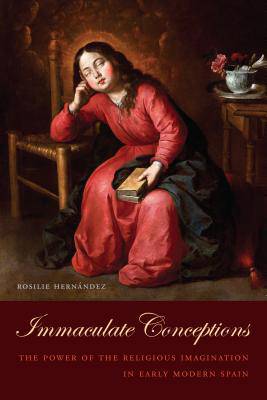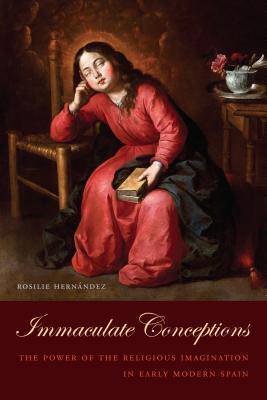
- Retrait gratuit dans votre magasin Club
- 7.000.000 titres dans notre catalogue
- Payer en toute sécurité
- Toujours un magasin près de chez vous
- Retrait gratuit dans votre magasin Club
- 7.000.000 titres dans notre catalogue
- Payer en toute sécurité
- Toujours un magasin près de chez vous
Immaculate Conceptions
The Power of the Religious Imagination in Early Modern Spain
Rosilie HernándezDescription
Immaculate Conceptions examines devotional writings, religious and literary texts, and visual art that feature the mystery of the immaculacy of the Virgin Mary in the culture of early modern Spain. The author's analysis is motivated by the complexity and multivalent capacity of the doctrine and its icon at a time when the debates around Mary's conception imbued all levels of religious and social life. She considers the many interests - political, doctrinal, artistic, and gender-driven - that intersect and compete in the exegesis and textual and visual representations of the Immaculate Conception. She argues that the Immaculate Conception of Mary proved to be a fertile conceptual and ideological field wherein the identities of the Spanish state, local communities, and individuals were negotiated, variously defined, and contested.
The study's broader aim is to delineate a speculative category, the religious imagination, defined as a spiritual, intellectual, or artistic pursuit in which the individual is committed to sacred truth yet articulates this truth through contingent, partial, and contextually determined theological propositions. The representational status of the image and its relationship to theories of physical sight and spiritual vision are central to the author's formulation of this category.
Spécifications
Parties prenantes
- Auteur(s) :
- Editeur:
Contenu
- Nombre de pages :
- 280
- Langue:
- Anglais
- Collection :
Caractéristiques
- EAN:
- 9781487504779
- Date de parution :
- 13-09-19
- Format:
- Livre relié
- Format numérique:
- Genaaid
- Dimensions :
- 155 mm x 231 mm
- Poids :
- 544 g







